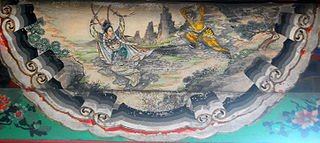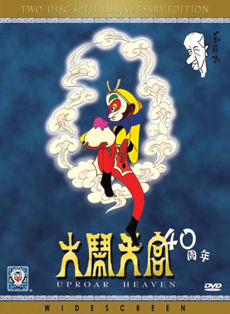
The Monkey King, known as Sun Wukong (孫悟空/孙悟空) in Mandarin Chinese, is a legendary figure best known as one of the main characters in the 16th-century Chinese novel Journey to the West (西遊記/西游记) and many later stories and adaptations. Inspiration for the Monkey King's origins predate the novel and can be traced back both to the Monkey-God, Hanuman, from the Hindu epic, the Ramayana as well as from the Song dynasty. In the novel, he is a monkey born from a stone who acquires supernatural powers through Taoist practices. After rebelling against heaven and being imprisoned under a mountain by the Buddha, he later accompanies the monk Tang Sanzang (唐三藏) on a journey to retrieve Buddhist sutras from the West where Buddha and his followers reside.

Journey to the West is a Chinese novel published in the 16th century during the Ming dynasty and attributed to Wu Cheng'en. It is one of the Four Great Classical Novels of Chinese literature. It has been described as arguably the most popular literary work in East Asia. Arthur Waley's popular abridged translation, Monkey, is well known in English-speaking countries.

Ruyi Jingu Bang, or simply Ruyi Bang or Jingu Bang, is the poetic name of a magical staff wielded by the immortal monkey Sun Wukong in the 16th-century classic Chinese novel Journey to the West. Anthony Yu translates the name simply as "The Compliant Golden-Hooped Rod", while W.J.F. Jenner translates it as the "As-You-Will Gold-Banded Cudgel".
A monkey is a tailed simian.

Zhang Jinlai, better known by his stage name Liu Xiao Ling Tong, is a Chinese actor best known for his role as the Monkey King in the 1986 television series Journey to the West adapted from the classic Chinese novel of the same name. Zhang adopted his father Zhang Zongyi's stage name, Liu Ling Tong, and amended it to Liu Xiao Ling Tong.

Princess Iron Fan, also known as Rakshesha, is a character from the 16th century novel Journey to the West. She is the wife of the Bull Demon King and mother of Red Boy. She is one of the most popular Journey to the West villains, alongside her husband the Bull Demon King, her son the Red Boy, the Six Eared Macaque, and Baigujing. She also appears in the film Doraemon: The Record of Nobita's Parallel Visit to the West under the name Queen Iron Fan, as the secondary antagonist.

Havoc in Heaven, also translated as Uproar in Heaven, is a Chinese donghua feature film directed by Wan Laiming and produced by all four of the Wan brothers. The film was created at the height of the Chinese animation industry in the 1960s, and received numerous awards. It earned the brothers domestic and international recognition. The story is an adaptation of the earlier episodes of the 16th century Chinese novel Journey to the West.

Mount Huaguo or Flowers and Fruit Mountain, is a major area featured in the novel Journey to the West. It is also the name of a popular tourist destination based on the novel.
Ao Guang is the Dragon King of the East Sea in Chinese folklore. He featured prominently in different works including Fengshen Yanyi and Journey to the West.
Son Goku or Son-Goku may refer to:

Saint is a manhua by Hong Kong comics artist Khoo Fuk Lung. It follows the life and adventures of Sun Wukong, the monkey king from the 16th century novel Journey to the West. It was first published by Jade Dynasty and is licensed by Yuk Long Limited.

Doraemon: The Record of Nobita's Parallel Visit to the West, also known as Doraemon's Parallel Journey to the West, is a feature-length Doraemon film which premiered on March 12, 1988 in Japan. It is loosely based on the 16th century novel Journey to the West. It is the 9th Doraemon film and last Showa-era Doraemon.

Bull Demon King, also translated as the Ox-King and known as his self-proclaimed title the Great Sage Who Pacifies Heaven, is a fictional character from the 16th century novel Journey to the West. He is the husband of the Princess Iron Fan and father of Red Boy. He is a demon king based in Sky Scraping Cave (摩雲洞) on Accumulated Thunder Mountain (積雷山).
Monkey King, or Sun Wukong, is a main character in the classical Chinese epic novel Journey to the West.

Journey to the West: Conquering the Demons is a 2013 fantasy comedy film co-written and produced by Stephen Chow and co-directed by Chow and Derek Kwok. The movie was first announced in July 2011 and was released on February 10, 2013 in China. The film is a loose comedic re-interpretation of the 16th century novel Journey to the West, a Chinese literary classic often believed to be written by Wu Cheng'en.

The Monkey King Festival is celebrated in China on the 16th day of the eighth Lunar month of the Chinese calendar, corresponding to September according to the Common era calendar, a day after the Mid Autumn Festival. The origin of the festival is traced to the epic 16th century novel Journey to the West written by the Chinese novelist Wu Cheng'en (1500–1582) during the Ming Dynasty (1368–1644). The novel brings out the concept of immortality from Taoism and rebirth from Buddhism. The monkey Sun Wukong, a character in the novel, is the featured figure of the festival.

The Monkey King 2 is a 2016 Hong Kong-Chinese action fantasy film based on the classic 16th century novel Journey to the West by Wu Cheng'en. The film was shot in 3D and is a sequel to the 2014 box office hit The Monkey King with Cheang Pou-soi returning as director and Sammo Hung as action director, who replaces Donnie Yen's role from the previous installment. The film stars Aaron Kwok, who portrayed the main antagonist in the previous installment, as the film's titular protagonist, who also replaces Yen from the previous installment. It was released in the United States on 5 February, in Hong Kong on 6 February and in China on 8 February 2016,

Journey to the West: The Demons Strike Back is a 2017 Chinese fantasy-adventure-comedy film directed by Tsui Hark. A sequel to Stephen Chow's 2013 film Journey to the West: Conquering the Demons, it was produced and co-written by both Tsui and Chow.

"The Great Sage, Heaven's Equal" is a short story by Pu Songling first published in Strange Stories from a Chinese Studio (1740). It revolves around Shandong native Xu Sheng, who initially rejects the existence of Sun Wukong but gradually becomes a firm devotee of him after encountering him and experiencing his power. The story acts as social commentary on the worship of mythical characters, in this case Sun Wukong. In 2014, it was translated into English by Sidney L. Sondergard.













